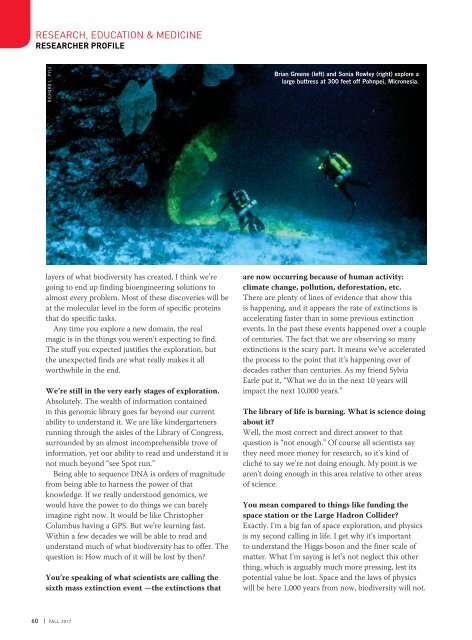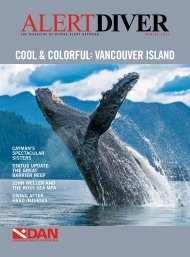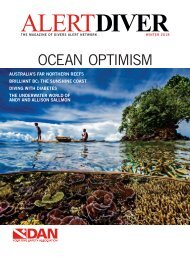AD 2017 Q4
Alert Diver is the dive industry’s leading publication. Featuring DAN’s core content of dive safety, research, education and medical information, each issue is a must-read reference, archived and shared by passionate scuba enthusiasts. In addition, Alert Diver showcases fascinating dive destinations and marine environmental topics through images from the world’s greatest underwater photographers and stories from the most experienced and eloquent dive journalists in the business.
Alert Diver is the dive industry’s leading publication. Featuring DAN’s core content of dive safety, research, education and medical information, each issue is a must-read reference, archived and shared by passionate scuba enthusiasts. In addition, Alert Diver showcases fascinating dive destinations and marine environmental topics through images from the world’s greatest underwater photographers and stories from the most experienced and eloquent dive journalists in the business.
You also want an ePaper? Increase the reach of your titles
YUMPU automatically turns print PDFs into web optimized ePapers that Google loves.
RESEARCH, EDUCATION & MEDICINE<br />
RESEARCHER PROFILE<br />
RICHARD L. PYLE<br />
Brian Greene (left) and Sonia Rowley (right) explore a<br />
large buttress at 300 feet off Pohnpei, Micronesia.<br />
layers of what biodiversity has created, I think we’re<br />
going to end up finding bioengineering solutions to<br />
almost every problem. Most of these discoveries will be<br />
at the molecular level in the form of specific proteins<br />
that do specific tasks.<br />
Any time you explore a new domain, the real<br />
magic is in the things you weren’t expecting to find.<br />
The stuff you expected justifies the exploration, but<br />
the unexpected finds are what really makes it all<br />
worthwhile in the end.<br />
We’re still in the very early stages of exploration.<br />
Absolutely. The wealth of information contained<br />
in this genomic library goes far beyond our current<br />
ability to understand it. We are like kindergarteners<br />
running through the aisles of the Library of Congress,<br />
surrounded by an almost incomprehensible trove of<br />
information, yet our ability to read and understand it is<br />
not much beyond “see Spot run.”<br />
Being able to sequence DNA is orders of magnitude<br />
from being able to harness the power of that<br />
knowledge. If we really understood genomics, we<br />
would have the power to do things we can barely<br />
imagine right now. It would be like Christopher<br />
Columbus having a GPS. But we’re learning fast.<br />
Within a few decades we will be able to read and<br />
understand much of what biodiversity has to offer. The<br />
question is: How much of it will be lost by then?<br />
You’re speaking of what scientists are calling the<br />
sixth mass extinction event —the extinctions that<br />
are now occurring because of human activity:<br />
climate change, pollution, deforestation, etc.<br />
There are plenty of lines of evidence that show this<br />
is happening, and it appears the rate of extinctions is<br />
accelerating faster than in some previous extinction<br />
events. In the past these events happened over a couple<br />
of centuries. The fact that we are observing so many<br />
extinctions is the scary part. It means we’ve accelerated<br />
the process to the point that it’s happening over of<br />
decades rather than centuries. As my friend Sylvia<br />
Earle put it, “What we do in the next 10 years will<br />
impact the next 10,000 years.”<br />
The library of life is burning. What is science doing<br />
about it?<br />
Well, the most correct and direct answer to that<br />
question is “not enough.” Of course all scientists say<br />
they need more money for research, so it’s kind of<br />
cliché to say we’re not doing enough. My point is we<br />
aren’t doing enough in this area relative to other areas<br />
of science.<br />
You mean compared to things like funding the<br />
space station or the Large Hadron Collider?<br />
Exactly. I’m a big fan of space exploration, and physics<br />
is my second calling in life. I get why it’s important<br />
to understand the Higgs boson and the finer scale of<br />
matter. What I’m saying is let’s not neglect this other<br />
thing, which is arguably much more pressing, lest its<br />
potential value be lost. Space and the laws of physics<br />
will be here 1,000 years from now, biodiversity will not.<br />
60 | FALL <strong>2017</strong>









